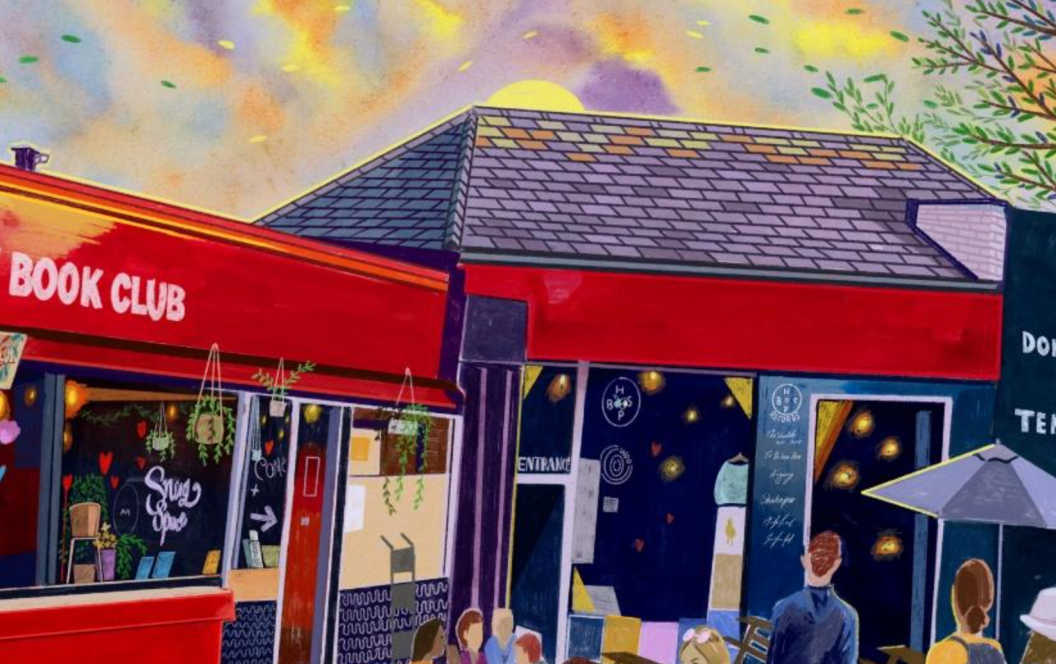Welcome back to your favourite event recap blog posts from the NDF. In the lead-up to the festival, we had Andy Walmsley of Wash Studios in conversation with Luigi Carnovale talk to us about how they got their start in the creative industry, problems they faced, modern issues in the current design industry, and how to preserve through the ups and downs.
The event began with an introduction from our founder Antonia Arbova, setting the scene for the Preston-based Wash Studios. Andy describes his own business as a ‘brand of disaster’, over his time as a creative he has become a self-proclaimed designer, film producer, art director, and artistry house- all titles that he has more than lived up to. Luigi and Andy have been friends for a long time but recently started working together on more projects since COVID-19.
Wash Studios is built up of four main components with a team of six people:
Wash studio: Everything brand related, focusing on identity from the start of a project through to the campaign.
Wash films: Focusing on film production.
Artistry house: The building they’re located in that runs events and acts as a place to host creative gatherings.
Artistry house interior: Dealing with the branding of the interior to create a streamlined continuity for brands for the in-house and external projects.
Andy highlighted his survival in the design world through the verb ‘Adapt’. To make or become suitable, changing to fit a situation. As a creative, you must adapt and re-invent yourself as technology and society change. After leaving school at 16 Andy went through his first adaption. He joined the Youth Opportunity scheme which provided £1,300 a year for creatives, which he did at Hamilton press, before moving to the Lancashire evening post, Preston’s big evening post at the time.
His role here was ad creation for the newspaper. At a time when there were no computers, everything was designed by hand. He focused on typography and the tight deadlines of evening turnarounds for his content. The big technology at the time was Letraset, a process of rubbing down letters to leave impressions on the page. This unique process is something that still influences the aesthetic choices of many bands and brands today.
At the start of his career, people learned on the fly. Reflecting on his career, he highlighted, how amazing it would have been to be in our current creative’s position, having the opportunity to receiving training and join the job market with a repertoire of skills already at your disposal. The feeling of imposter syndrome isn’t reserved for the up-and coming generation of creatives but something that Andy can relate to deeply. He struggled deeply with this and anxiety at not being good enough for a position but didn’t let this crush his creative spark.
Creatives at the time didn’t have the same nomadic ability as us today. In a society ridden with industry oppression that led to needed strikes from unions, many jobs were of consequence lost. And there was little option of starting your own design studio. Andy recalled this, and emphasised the importance of knowing the world you’re living in. In 1991, he was offered a job at a game company as a character designer. He had many inspirations in this era like Josh Kirby, Roger Dean, and Terry Pratchett, but turned down the job as he didn’t see a future in gaming. He laughed about his lack of foresight. Technological advances are coming, and they come hard and fast, at the time it’s easy to ignore what’s happening around you, but it’s important to reflect on the possibility of what something could be. Luigi made the same observations about technology, and how roughly every five years there’s a seismic shift towards technology. Our current shift appears to be with the use of AI. AI is scary for what it presents, cutting corners and removing designers. But something AI doesn’t have is the human spirit. It can learn a lot, but it learns it from us. There will be a place for AI in the design world, but replacing designers is not it.
Eventually, Andy moved onto the agency world and decided to try his hand at being an advertising agent. He took the time to teach himself illustration with magic markers. The times weren’t like now, there was a big clock always ticking behind you and this pressure was hard, but also gave him the confidence to trust his instincts, there wasn’t time to produce three versions of something or allow self-doubt to creep in. You had to adapt to the nerves and trust in your abilities. At the time, Andy drew everything, spent his time with glue, sticking and cutting, and never expected that the visuals he was asked to do for the Grantham’s (Apple's future MacBook) would ever replace the traditional methods. However, this time Andy saw the technology for what it was and embraced the change rather than ignore it. He didn’t want to spend his time clicking pixels all day and could see the divide in designers coming: the ones who refused to adapt to the new technology, and the ones who embraced it.
Andy used his powers of manifestation again and came into being an Art Director. His first job in this was a motorcycle cage shoot. This career change saw him going to interviews in bigger cities like Manchester. He shared his interview experiences with the audience, supported by Luigi. Covering a broad scope, they shared their experiences on presenting directly to studio heads, the times his anxiety, would leave him unable to speak in front of them. There were no training wheels, it was cutthroat with the CEO’s. This is where Andy decided what he wanted his career to look like. The bigger work which was more glamorous was in these big cities, but he wanted to do local nitty-gritty work.
Design is from the heart. You feel it in your soul, and your works are creations of yourself.
This means, that not everybody will want to work with you. But what’s beautiful is the people who do want to work with you, the people who see your heart and bet on that chance. You won’t be able to work with everybody, and why would you want to? If they don’t want you, you shouldn’t want them. Passion eventually always wins out.
This is where Wash Studios was created in March 2003. He and two brothers established their design company. They saw lots of ups and downs, but Andy remembered this was his first experience dealing with compromising your own beliefs with the need for work. When they had a big contract with a big company, Andy presented design in the hopes of changing the morals of the company, making a change for the better. Unfortunately, the company didn’t see it this way and they lost the contract. Although this was a hard loss for the business it was important to understand how the world of business is tough for the hopeful. Understanding what your role is and how to contribute to a brief when your beliefs may be different is a curve creatives have to deal with internally.
Andy didn’t let the setbacks stop him and in 2006, worked on the Arndale and Media City in Manchester when it was first being established. He put his passion into a ‘What is media?’ campaign, exploring what media is, what it does, and how it makes us feel. Andy declared boldly, ‘The only thing stopping us now is a global recession or a world war.’ Sadly, for Andy, his manifestations once again came true and the recession of 2007/8 hit, and the contract was lost.
The world of design is a bumpy ride, but after some lows, Andy found his highs. He worked for both Jaguar and Hyundai, not as a designer, but now in artistic design and video work. Andy’s had great campaigns with both companies, covering a ‘petrol heads’ campaign, and more recently a ‘dinosaur’ commercial for the promotion of electric cars during the pandemic.
Andy’s career is now contributing back to his business and his team whom he loves dearly. Without their help, Andy doesn’t believe his company would be what it is today, and for that, he’s forever grateful. Wash studios can be found in Preston city centre.
The talk finished with a Q&A from the audience and final talks with both Andy and Luigi.
This talk was a wonderful insight into the world of design and the bumps you can face along the way. Andy chose to share his story with aspiring creatives and gave them a very real look into life in such an evolving career. This bring an end to the recap of the NDF’s second big event, join us next time, in person or on our recap to see what other aspects of design are open to creatives.




